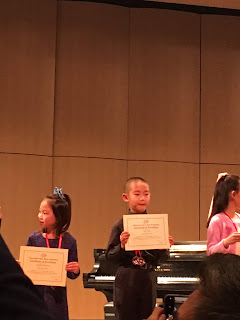My pedagogy class has recently surveyed some wonderful and creative methods books for the beginners. However, when it comes to choosing the ones that suit and motivate our young students, what are the principles shall we consider?
Here are the five considerations:
- Age: A child, particularly younger than 6 years old, will probably draw to the books that are colorful with attractive graphics. I had a student who practiced significantly more because the method book is full of lovely and fun cartoon figures!
- Content: is the method book in an all-in-one format that includes theory, ear training, and repertoires? or it comes in separately like the lesson, technique, theory and supplementary materials? does the piece sound attractive? does the content layout look too busy or clear?
- Pace: some methods books progress faster than the others, and this is a determining factor for choosing a particular method for your student. Too fast pace may end up frustration and too slow lead to boredom.
- Approach: does the book focus on position reading or intervallic reading or both? does the author emphasize a specific teaching idea?
- Teaching and learning styles: does the method book seem to be in a logical order or approach to you? do you prefer your students to begin with black or white keys? on or off-staff reading? Is it a good fit for a visual or auditory student?
There are tons of incredible methods in the market, here are just a very few methods books that I reviewed based on popularity, longevity and unique approach. The rote teaching methods were introduced in my previous
blog: Moderate pace with intervallic approach to landmark notes. This series is probably the most popular one along with the Faber Piano Adventures.
Faber Piano Adventures: Slow to moderate pace. Comparing to Alfred's Basic Piano Library, this series progresses at a slower pace with more detail drills in each exercise/concept. Almost one-third of the primer book focuses on the off-staff and finger number reading.
Bastein New Traditions All-in-one Piano Course: Slow to moderate pace with detail/repetitive drills of each concept, addresses both position and intervallic reading with popular tune arrangements. Comes with fun and colorful drawings. Primer A is only for off-staff and finger number reading. Primer B starts staff reading with middle C.

John Thompson's Modern Course For the Piano: Teaching Little Fingers to Play: Moderate to fast pace with colorful animal figures. Intervallic approach with an emphasis on "stepping up and down, then a skip." There is no off-staff reading. Moving hand positions, playing with hands together and crossing hands are included in this book.
Tales of A Musical Journey by Irina Gorin: Moderate pace with an emphasis on building fundamental techniques such as the firm fingertips, free moving wrists and arms by starting with strong fingers (3rd finger) first and non-legato playing. The book introduces the musical concept through a fairy-tale telling.
Poco Piano for Young Children: Similar to Tales of A Musical Journey, this method starts playing with the 3rd finger. Like its title, it is meant for children probably younger than 5 years old. Strong emphasis on staff line and intervallic reading with big colored staffs and notations. There is no off-staff reading.
Piano Discovery: Slow to moderate pace with pastel color art-work background and characters. The on-staff starter book centers on the notes of middle C position with step-by-step detail instructions.
Happy exploring!















